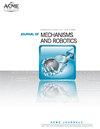救援用软体机器人的设计、性能分析与实验
IF 3.2
4区 计算机科学
Q2 ENGINEERING, MECHANICAL
Journal of Mechanisms and Robotics-Transactions of the Asme
Pub Date : 2023-10-20
DOI:10.1115/1.4063669
引用次数: 0
摘要
在狭窄而不规则的废墟环境中,现有的救援机器人难以达到其性能。受巨型食蚁兽捕食白蚁过程的启发,我们提出了一种利用类似齿轮啮合的运动推进和连续体机械臂的适应性的软救援机器人。该机器人由柔性连续机械臂和驱动装置组成,具有快速推进和适应非结构化环境的特点。驱动装置可使机械手的最大速度为14.67 cm/s,推进力为19.20 n。软机器人的灵活性使其能够适应推进下的环境,通过障碍物。不同条件下的自适应性能测试实验表明,该机器人可以通过其轴线与接触面夹角达80.57°的障碍物。在实际废墟实验中,机器人可以在由砖块形成的狭窄通道中穿透1.3 m深。实验表明了所设计的救援机器人的可行性。我们的工作有助于研究软机器人与环境的相互作用。本文章由计算机程序翻译,如有差异,请以英文原文为准。
Design, performance analysis, and experiments of a soft robot for rescue
Abstract In the narrow and irregular environment of the ruins, the existing rescue robots are struggling to achieve their performance. Inspired by the process of termite predation by giant anteaters, we propose a soft rescue robot that utilizes motion propulsion similar to gear meshing and the adaptability of a continuum manipulator. The robot, consisting of a soft continuum manipulator and driving equipment, has the characteristics of fast propulsion and adaptation to unstructured environments. The driving device can give the manipulator a maximum speed of 14.67 cm/s and a propulsive force of 19.20 N. With the flexibility of the soft robot, the soft manipulator can adapt to the environment under propulsion to pass obstacles. The experiments of self-adaptability performance tests under different conditions show that the robot can pass over obstacles with an angle of up to 80.57 deg between its axis and the contact surface. In the actual ruin experiment, the robot could penetrate 1.3 m deep in the narrow passage formed by the bricks with the mode. The experiment indicates the presented rescue robot design's feasibility. Our work could contribute to the research on the interaction of soft robots with their environment.
求助全文
通过发布文献求助,成功后即可免费获取论文全文。
去求助
来源期刊

Journal of Mechanisms and Robotics-Transactions of the Asme
ENGINEERING, MECHANICAL-ROBOTICS
CiteScore
5.60
自引率
15.40%
发文量
131
审稿时长
4.5 months
期刊介绍:
Fundamental theory, algorithms, design, manufacture, and experimental validation for mechanisms and robots; Theoretical and applied kinematics; Mechanism synthesis and design; Analysis and design of robot manipulators, hands and legs, soft robotics, compliant mechanisms, origami and folded robots, printed robots, and haptic devices; Novel fabrication; Actuation and control techniques for mechanisms and robotics; Bio-inspired approaches to mechanism and robot design; Mechanics and design of micro- and nano-scale devices.
 求助内容:
求助内容: 应助结果提醒方式:
应助结果提醒方式:


